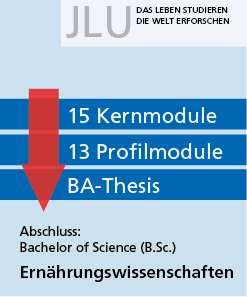Composition of the Study Programme
Components of the study programme
The programme consists of 17 core modules (compulsory modules) and 11 profile modules (elective modules). Each module has a scope of 6 CP (4 hours per week for one semester) and concludes with a course-related examination. The grades achieved in the individual module examinations result in the final degree grade. In addition, the programme includes a Bachelor's thesis, which is equivalent to 2 modules. This proves that you are capable of independently writing a scientific paper.
Individual profile
The development of an individual profile plays a major role in the degree programme. Our students decide for themselves whether they want to acquire a broad all-round knowledge or prefer to specialise, whether their studies are more practice-oriented or scientific and theoretical. They can choose profile modules from the complete range of courses offered by the Department 09 or even from other departments at JLU.
Practical relevance
In addition to choosing practice-oriented modules, students have the opportunity to complete an internship to gain a first insight into professional life. Module BP 144 "Professional Internship" corresponds to 12 CP and can be chosen as a profile module in all Bachelor's degree programmes of Faculty 09. In this way, students familiarise themselves with the professional world and get suggestions for the individual organisation of their further studies. The Internship Office maintains a database of suitable companies and institutions and supports students in their search for a suitable internship.
Composition of degree programme

The course content is divided into modules. Each module has a scope of 6 CP (4 semester hours per week) and concludes with a course-related examination. The grades achieved in the individual module examinations result in the final degree grade. 17 of the modules are compulsory (core modules), 11 modules are profile modules and can be selected from the entire range of courses offered by the department. The Bachelor's thesis corresponds to the scope of two teaching modules.
Individual specialisation takes place through the choice of profile modules. The degree programme is successfully completed when all modules have been passed.
| 1st semester | 2nd semester | 3rd emester |
|---|---|---|
| Biology | Basics of biochemistry | Nutritional physiology |
| Anatomy and Physiology | Food of animal origin | Basics of nutrition therapy |
| Plant-based foods | Human nutrition |
Physiology of the gastrointestinal tract |
| Basics of process technology and thermodynamics | Food chemistry, analysis and law | Immunological basics for nutritional science |
| General Chemistry | Basic Chemistry Practical | Age-specific nutrition |
| 4th semester | 5th semester | 6 th semester |
|---|---|---|
|
Practical course in nutritional science |
Specialisation module 4 | Specialisation module 9 |
| Statistics and study design | Specialisation module 5 | Specialisation module 10 |
| Specialisation module 1 | Specialisation module 6 | Specialisation module 11 |
| Specialisation module 2 | Specialisation module 7 | Bachelor's dissertation |
| Specialisation module 3 | Specialisation module 8 | Bachelor's dissertation |
Specialisation modules
Broad all-round knowledge or specialisation - both are possible. Our students have it in their hands, they put together their studies according to their individual inclinations from the whole range of our offers. In a catalogue of over 80 modules, students can choose profile modules from, for example, the following topics:
- Human nutrition
- Dietetics
- Biochemistry and molecular biology
- Nutritional Medicine and Therapy
- Nutrition and the Immune System
- Food Sciences
- Molecular Nutrition Research
- Communication and counselling
- Nutritional and environmental psychology
- Consumption
- Market theory
- Agricultural, Food and Environmental Policy
- Business Administration
